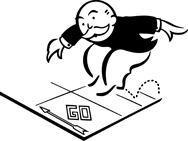 column_buckwolf
column_buckwolf
Boardwalk Brouhaha: Monopoly Enters Debit Card Era

(Page 3 of 4)
Some game historians say other board games were strikingly similar to the one that Charles Darrow, an unemployed heating salesman, originally showed to Parker Bros. The Landlord's Game — popular at Quaker schools in Atlantic City in the '20s and '30s — even bore the same striking "Go to Jail" corner square that has menaced generations of Monopolites.
Monopoly and the Landlord's Game even contain the same misspelling on its board — Marvin Gardens. As residents of the New Jersey seaside community will tell you, the real name is Marven Gardens, even though gamemakers let "Marvin" stand as is for decades.
Unlike its rival, the Landlord's Game, patented by Lizzie Magie Phillips of Virginia in 1904, was hardly meant to teach kids to be real estate tycoons. Rather, it was meant to mock heartless enterprise. Phillips offered it to Parker Bros. in the early 1920s but the company declined. (Proof, perhaps, that capitalism is indeed evil.)
Parker Bros. eventually bought the rights to several similar games, effectively monopolizing Monopoly. And ironically, during the Great Depression, when a fifth of the country was unemployed, this capitalist board game became a leading form of entertainment for families left penniless by the stock market crash.
Over the years, Monopoly has become an international sensation, with worldwide competitions. According to the Hasbro Web site, the longest game of Monopoly lasted 1,680 hours (more than 70 days). Another Monopoly game lasted 99 hours in a tub, and someone somewhere played the game upside down for 36 hours.
Monopoly has also carved a unique niche in modern history, marking some unforgettable milestones. Here are a few:
Great Train Robbery Monopoly: When a 15-member gang hauled off the equivalent of more than $5 million from a Glasgow-to-London postal train in 1963, the press quickly dubbed it Britain's Great Train Robbery. If not for a game of Monopoly at their hideout, the robbers might have gotten away.
Holed up at an Oxfordshire farmhouse, the gang passed the time playing Monopoly (with stolen money, by some accounts). When it heard the police was on its trail, it fled a little too quickly.
Police lifted fingerprints from the game board, which served as damning evidence in the courtroom. Not surprisingly, the judge failed to honor their "Get Out of Jail Free" cards.
Great Escape Monopoly: How about some real-life "Get Out of Nazi Prison Camp" cards? American fliers held at Stalag Luft III (made famous in the film "The Great Escape") received phony passports, railroad tickets and other materials that had been glued within Monopoly game boards.
"We did some elaborate things at the outset," former soldier Lloyd Shoemaker of Salem, Ore., told The Seattle Times in May 1987, describing how Monopoly boards had to be cut apart and then glued back together again to accommodate the smuggled items. Real money for the escapees was slipped into packets of play money, and one can only assume that U.S. military intelligence had issued commands on secret codes printed on "Community Chest" cards.











